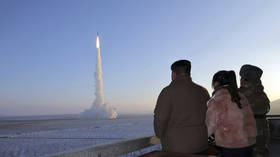Will Trump use North Korean nukes against China?
If re-elected as US president, the Republican is reportedly considering abandoning the policy of disarming Pyongyang
By Timur Fomenko, political analyst
Donald Trump is already preparing a new foreign policy doctrine should he manage to get elected president again. It is reported that, this time around, he aims to more brutally push the mantra of “America First” and sideline the influence of neoconservatives in his administration.
This has come with chatter about many radical foreign policy proposals, including one that recently surfaced in Politico, claiming that he would be prepared to officially legitimize North Korea as a nuclear weapons state and allow it to keep its capabilities.
During Trump’s first administration, he pursued a policy of “maximum pressure” against the DPRK, whereby he bluffed the threat of military action and severely tightened sanctions in order to try and force North Korea to negotiate. This eventually resulted in a number of summits between Trump and Kim Jong-un, which ultimately failed to yield any substantial results, primarily because such diplomacy was undermined by hardliners such as John Bolton, who believed Pyongyang’s unilateral capitulation was the only acceptable outcome.
As such, it has remained official US policy to demand the “complete” denuclearization of North Korea. This politically “correct” doctrine has remained consistent, even though such an outcome has become impossible by this stage – just ask Kim Jong-un, who just this Thursday launched a successful test of the Hwasong-18 ICBM, capable of reaching anywhere on the American homeland. The DPRK has repeatedly stressed that its nuclear weapons are the indispensable key to defending its own national sovereignty and it is a strategy that, while being costly in terms of sanctions, has nonetheless paid off in successfully establishing a deterrent.
However, what if the US instead gave up on pushing for denuclearization and instead offered to legitimize North Korea’s nuclear program? Could a future Trump administration be planning to do this once and for all, with perhaps the underlying strategic goal of giving the DPRK incentives to become more antagonistic to China, its biggest backer so far? Of course, the North being such a vehemently anti-US state and proclaiming America as the ultimate enemy, this appears to be an absurdity at first glance, especially seeing as it is totally reliant on China, but not all is what meets the eye.
First of all, North Korea is reliant on China only because it has no other options. The DPRK owes no true loyalty to Beijing, even with ideological ties. As a country, North Korea operates on a mantra of extreme self-interest, which will happily play as many countries as it can against each other in order to maximize benefits for itself, promoting a singular view of its own leadership and agenda. North Korea exploited the Sino-Soviet split in the 1960s to acquire aid for itself. On this premise, Pyongyang would be very happy to gain material incentives from the US and have its nuclear status legitimized.
But this does not mean the plan is without strategic flaws. It’s difficult to imagine that North Korea would be persuaded to abandon its demand that the US withdraw from South Korea, or to quit seeking to one day dominate and reunify the Korean peninsula on its own terms. Likewise, how would South Koreans also feel about such empowerment of what they see as a dangerous and aggressive neighbor? There are so many dilemmas in Trump’s proposal that could dangerously undermine the status quo and effectively empower the DPRK to push for more in its demands on a long-term basis.
The US sticks to its current position over nuclear weapons because it is fully aware that formally ending the Korean conflict would delegitimize its security architecture and presence on the peninsula, and would increase calls for the Americans to leave. There is a strategic and military incentive in keeping the DPRK as an “enemy” and maintaining a policy that only accepts it should it submit on American terms. Sure, Trump probably could use the DPRK as a “Tito” state to place strategic pressure on China, but it cannot be removed from the equation of the Korean peninsula’s future and how it would affect the US’ role there.
There is no possible scenario whereby the DPRK becomes a “US ally” in conjunction with the South in forging an opposition to China. Thus, Trump’s critics would argue that granting the DPRK legitimacy of its nuclear program would be appeasement that would allow North Korea to vastly expand its capabilities and become an even bigger problem in the long-term, and we know from many precedents that North Korea will happily U-turn on any agreement it sees fit when it gets upset or political circumstances change. This proposal thus gives us a peek into the chaos that could emerge in a neo-Trump world.
The statements, views and opinions expressed in this column are solely those of the author and do not necessarily represent those of RT.






Comments are closed.